YAGI PCB 2.4GHz WiFi antenna for ESP-NOW
There are YAGI Wi-Fi PCB antennas available on Aliexpress for the 2.4GHz band. However, I didn't need such an antenna for a typical Wi-Fi card. I'm using ESP32 modules with omni-directional antennas, which transmit information between two buildings about 300m apart after ESP-NOW. One module sends information, the other receives information, it is a one-way transmission. There is no visibility between the buildings, which are obstructed by trees and other buildings. The distance of 300m is not a special achievement, as one can find information about successful attempts with ESP-NOW at 1km with optical visibility.
Such a simple set-up allowed data transmission over a distance of 300m:
.
However, sometimes all that is needed is a reinforced concrete building with a large slab in the communication path and the range barely reaches 50m or less. I had a chance to check the included omnidirectional antennas and you can see the alignment for the 2.4GHz band:
.
What did I need the PCB YAGI antenna for?
I wanted to use similar connectivity between two buildings about 430m apart. This time the omnidirectional antennas did not provide transmission. Unfortunately I did not know whether the problem was the distance or the terrain obstacles. It remained to do a practical test and the PCB antenna went into the receiver.
Also, I had the opportunity to test whether the antenna responds to frequencies in the 2.4GHz band:
.
Interestingly, the PCB antenna detached when placed on a clapboard desk. Perhaps the moisture in the wood affected the antenna's performance?
The antenna connector required a suitable u.FL - SMA adapter:
.
After using a YAGI antenna on the receiver, transmission over approximately 430m was possible!
The dimensions of the antenna are approximately 50mmx100mm so place greater mounting requirements than an omnidirectional antenna:
.
The PCB shows three directors, a dipole and a reflector:
On the other side there is some magic with the paths concerning the w.cz
Request for a hint as to what is going on here, is this some kind of impedance matching?
The antenna has proved successful in providing adequate range for transmission, but it is not always possible to transmit data using ESP-NOW in the 2.4GHz band,
urban conditions severely hamper propagation in this band. The numerous Wi-Fi APs operating in this band also do not make the task any easier.
Have you used PCB antennas or ESP-NOW, what kind of ranges have you been able to achieve? .
Such a simple set-up allowed data transmission over a distance of 300m:
.
However, sometimes all that is needed is a reinforced concrete building with a large slab in the communication path and the range barely reaches 50m or less. I had a chance to check the included omnidirectional antennas and you can see the alignment for the 2.4GHz band:
.
What did I need the PCB YAGI antenna for?
I wanted to use similar connectivity between two buildings about 430m apart. This time the omnidirectional antennas did not provide transmission. Unfortunately I did not know whether the problem was the distance or the terrain obstacles. It remained to do a practical test and the PCB antenna went into the receiver.
Also, I had the opportunity to test whether the antenna responds to frequencies in the 2.4GHz band:
.
Interestingly, the PCB antenna detached when placed on a clapboard desk. Perhaps the moisture in the wood affected the antenna's performance?
The antenna connector required a suitable u.FL - SMA adapter:
.
After using a YAGI antenna on the receiver, transmission over approximately 430m was possible!
The dimensions of the antenna are approximately 50mmx100mm so place greater mounting requirements than an omnidirectional antenna:
.
The PCB shows three directors, a dipole and a reflector:
On the other side there is some magic with the paths concerning the w.cz
Request for a hint as to what is going on here, is this some kind of impedance matching?
The antenna has proved successful in providing adequate range for transmission, but it is not always possible to transmit data using ESP-NOW in the 2.4GHz band,
urban conditions severely hamper propagation in this band. The numerous Wi-Fi APs operating in this band also do not make the task any easier.
Have you used PCB antennas or ESP-NOW, what kind of ranges have you been able to achieve? .



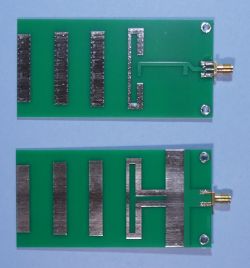
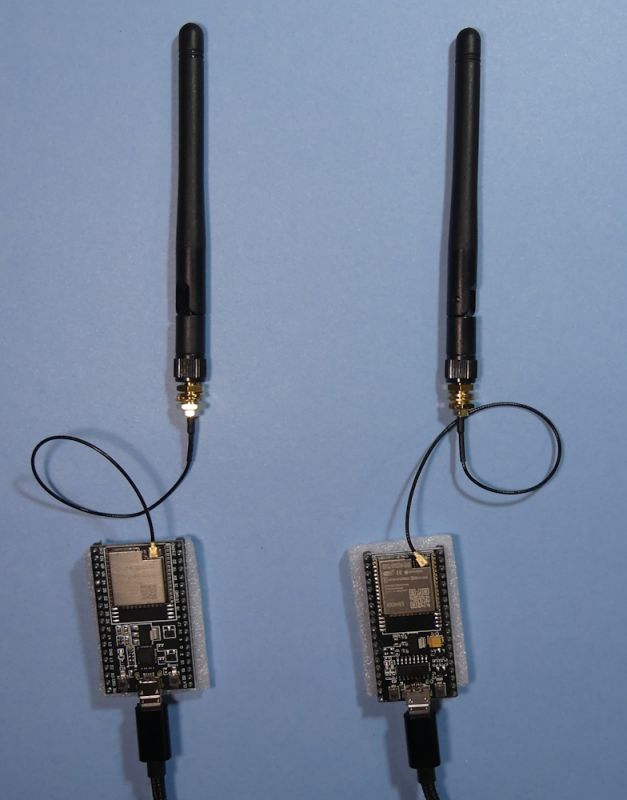
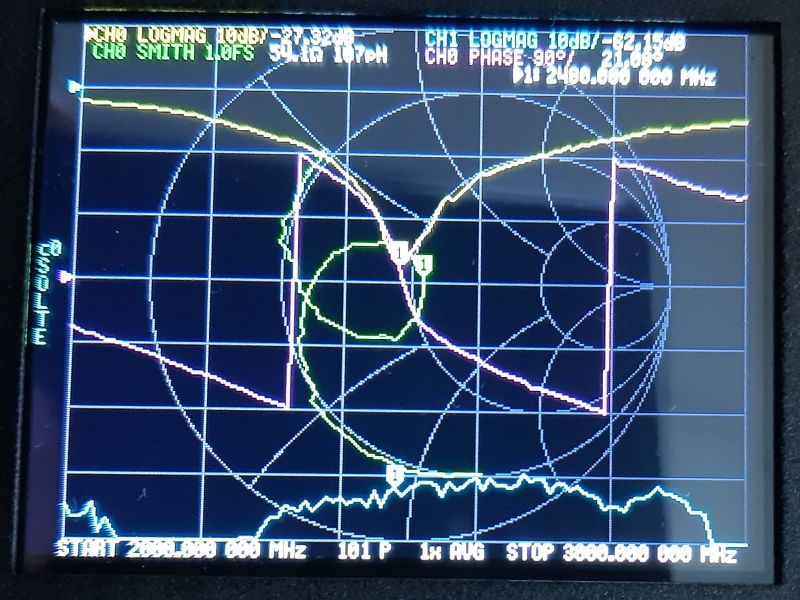
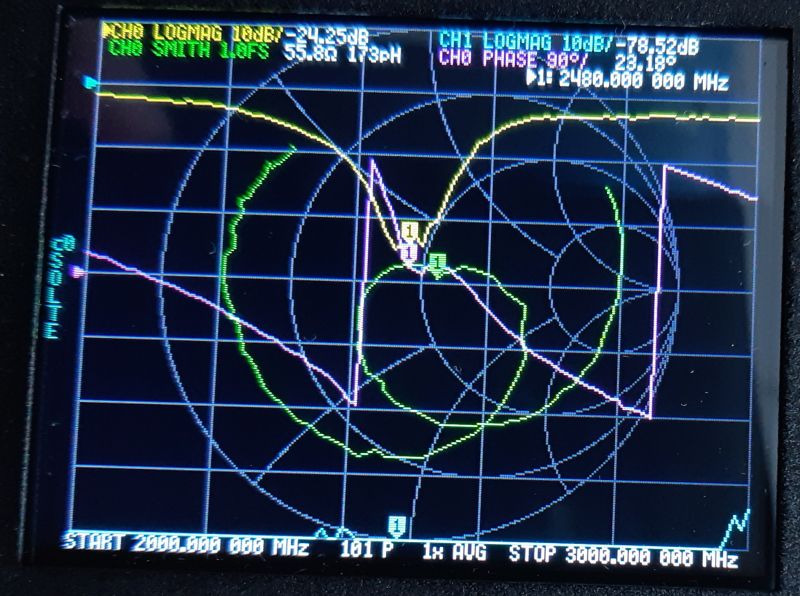
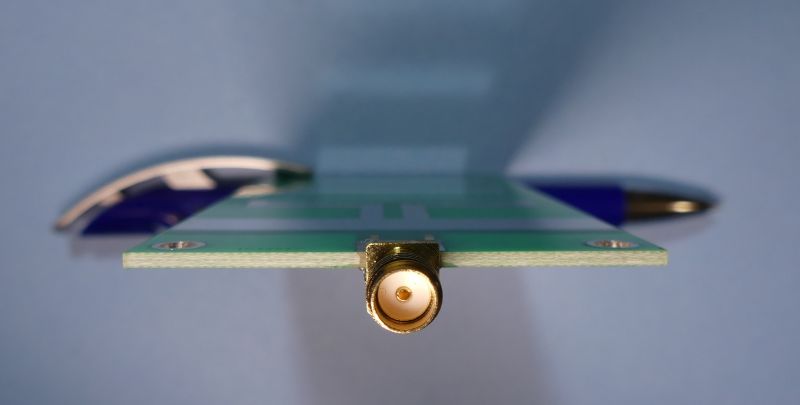
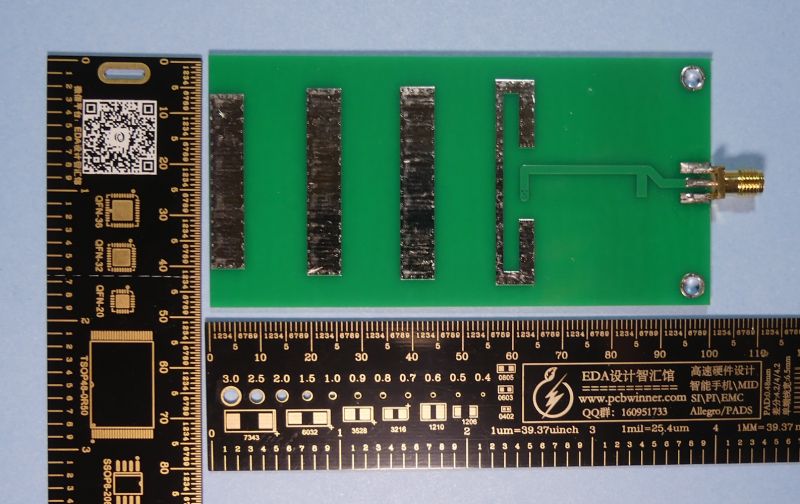
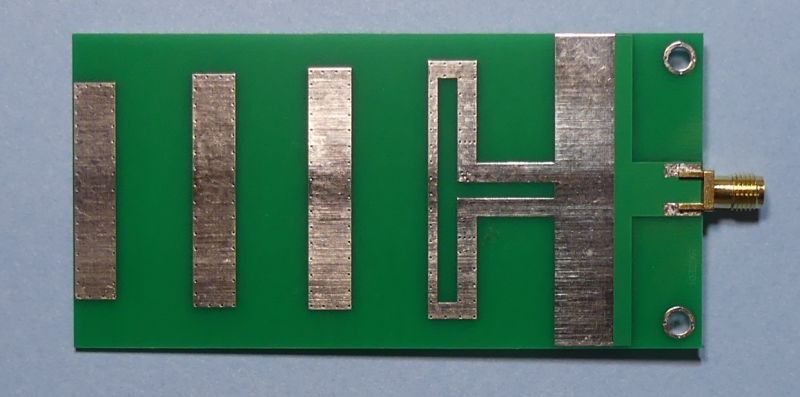
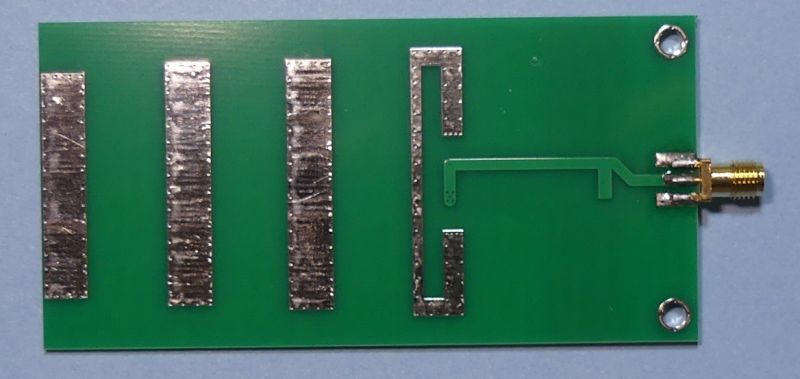
Comments
A Yagi antenna is always a gain because of its directionality. For the same power, much more power radiated in the concurrent direction, also in reception increased gain. [Read more]
. It is rather not clinker but furniture grade, like MDF, HDF or particleboard. In the furniture industry it is not used, if only because the surface is not very even (coarse chip). You made me curious... [Read more]
The magic mentioned may be the symmetrizer matching the impedance of the dipole to the coaxial cable. [Read more]
. You've hit it - a Yagi antenna is a directional antenna as a rule. [Read more]
It has a directional characteristic, the transmitter had a vertical omnidirectional antenna so I vertically aligned the dipole in the receiver, then with the directors in the direction of the transmitter... [Read more]
. Similarly a very good price/effort/effect ratio. I haven't tested it, I once made such an overlay for an omnidirectional antenna pretending to be a Yagi (i.e. reflector and directors, the antenna did... [Read more]
Mine made from workshop junk and painted with some spray paint tip after 7 years; https://obrazki.elektroda.pl/2480108200_1723131005_bigthumb.jpg I already have new cabling laid and it's... [Read more]
If ESP Now packets are being lost, you could try switching the receiver and transmitter modems rigidly to the 802.11b standard. https://obrazki.elektroda.pl/5992936000_1723131706_thumb.jpg . For... [Read more]
The omnidirectional one should be quite simple: https://mbharris.co.uk/articles/antenna/omni/quarter/ There are also those made from several sections of coax: http://wireless.gumph.org/articles/homemadeomni.html Omnidirectional... [Read more]
I have little experience with ESP32, but Espressif reports that up to 1km straight line range can be achieved in LR mode (ESP32 only) at the expense of speed. The gain over 802.11b is 4dB, which translates... [Read more]
. These canned Pringles are steamy. Apart from social media fame and ease of making, they have no merit. I made carefully, measured and was hugely disappointed. I made mine from a tin can with converted... [Read more]
Pringles would work if they were metal like a real can. They are so-called horn antennas, very directional. And something like this, a combination of a yagi in a tube: https://www.youtube.com/watch?v=Thpdfw2b9uM... [Read more]
Unfortunately 802.11 LR mode is not supported in ESP-NOW. [Read more]
That's not the problem. I hadn't even considered non-metallic Prngels packaging. In a forum like this, making aerials out of these non-metal or non-metal cardboard ones should only inspire pity. The tubes... [Read more]
Here are tests of this can and measurements. It appears that the diameter is too small. https://www.speedtest.pl/wiadomosci/sprzet/antena-z-puszki-do-pringlesow-prawda-czy-mit/ [Read more]
The topic of WiFi strip antennas (and more) has been covered on this forum in the distant past: https://www.elektroda.pl/rtvforum/topic127400.html [Read more]
Still coming back to the 802.11 modes of ESP operation. I can't find what the default mode is e.g. When running ESP as a soft AP. Maybe someone has read up? [Read more]
. You probably won't find this information in the official Espressif documentation. However, there is nothing to prevent you from checking it. For the ESP8266 you can use the function wifi_station_get_ap_info... [Read more]
HDF or MDF boards are clapboards precisely.... and particleboards are MFP boards (most commonly used in the furniture industry), coarse chipboards are OSB boards which have recently been used like furniture... [Read more]